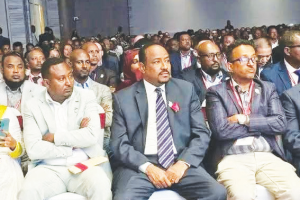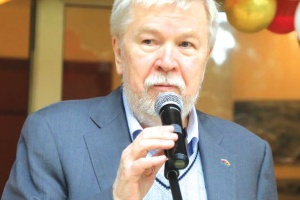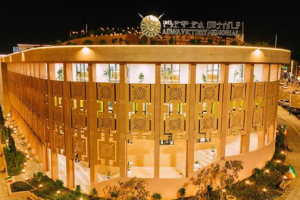
BY KFLEEYESUS ABEBE
Ethiopian literary works in the past were mere reflection of day today life as it is. They are conservative in nature: appreciating or promoting Christian or religious themes, describing nature, bowing to authority or communal practices. Pointing out flaws or things that are holding back the country and its people from progress or better life was rare or cautiously dealt with. But authors on the course of the time increased their pressure critiquing backwardness, harmful practices, corruption and dictatorship.
In an effort of emphasizing on their themes authors have explored various kinds of literary techniques. Literary devices allegory, satire or others continued to be used by authors to achieve their goal of delivering message, changing views, ways and demanding system change. Dagnachew Worku in his acclaimed book “Adefres” went far with style and message to challenge people who slaved themselves for old ways. In the story, the character who is a modernist surrounded by very conservative bonded people but he maintained his views untill they stoned him. Abe Gubegna by his book “Aleweledim”/ I won’t be born told the extremities of life challenges in Ethiopia. Abe in his unborn characer exposed the system for its premitiveness and corrupted nature. If not exceeding, Wondimu Geda’s Aleph will be a significant book in Ethiopian literature for its courageous deviation, rich language and analytical content.
The story is about a mad man without even proper name. He just goes by funny nickname “ Gelbicho” or “Denibicho” and travels from Arat Kilo area to Merkato and many places through his imagination. Like any mad man, “Gelbicho” or “Denibicho” doesn’t reserve his thoughts to himself. He just rather let everything out. He talks about females and femeninism, religion and the faithful, leadership and leaders, history and people, langauge and lingustic, love and lovers, sexuality and other things that affect people particularly Ethiopians. The author attempted to exploit the insanity of his character to mirror and challenge Ethiopians norms and views on faith, power and love. He questions almost everything. The character is a moral figure trying to escape from hypocrisy, theft, stupidity, and ego through his madness.
In his character portral, the writer made “Gelbicho” or “Denibicho” speak hard and old words. The words in some cases are taboo words, magic words or even words from Geez language. When you proceed your reading you would know they are intended and have purpose. Gelbicho” or “Denibicho is very complaining. He even prefers his lonliness and want to die than living with immoral people. He doesn’t even want to get burried along with such people. There is higher level of irony
Gelbicho” or “Denibicho ideas on some point clear, powerful and well thought and in other times it is trivial, bizaree and fragmented. Random characters with unusual name appear and ask him about various issues. Gelbicho” or “Denibicho responds from his observation and knowledge though he consistently doubts himself and presents alternative perspectives. He is uncertain about his ideas and how others recieve it. The author tests readers ability of analyzing things while he asks, describes, compares and constrast many things even the things we take for guarant.
Ultimaltely, the author showcases lack of knowledge or basic reasoning ability to be among leading problems of Ethiopian society in this time. The Ethiopian people as he puts in some places in the book have too much pride or self-conceit. “Because you don’t have knowledge principle, you have me when I hate you and you get mistaken when I made a mistake.”
It seems that the author advocates courage for people to get rid of ignornace and find with wisdom. So, they can find freedom and enjoy fruits of change. “They think they will make change by terrifying others. They fear love (I was thinking I snatched this? Oh, it is Laurate Tsegaye Gebremedhin scarying me saying “We fear”. They may have scared him off too. Those who scare him must have been afraid for themselves. While I am being scared, let me say “ The world is created by fear” Bertrand Russell must have been sacred much to say: “To conquer fear is the beginning of wisdom.” They insist me to adapt my fear. I don’t whether they want me to be remain fearful. Oh poor us”
On the otherside, many things are being done by the fear others opinion. He doesn’t spare anyone from criticism as he said the following about politicians. “For them not to say I have no ideas or worrying something happen before I said something, I said, “ We have should just see these days politicians not believeing or doubting them. If they escape from everything, they won’t escape from imposing self will. Political science talent and political science knowlege, heartfelt integrity and political commitment doesn’t come easy.”
The solution for author is law and basic knowledge. “Our jobs is paving the way. The solution is on the law and heart.”
Among other things, the author criticised our obsession for division. “When I am spared from cruficixon, one of the crucifers asked me: “From Queen Farah, Aba Gedas, Emperor Menelik, King Kawo Tona, Empeor Yohannes, Sultan Hanfere, Ali Mirah… which one are you proud of.
“ I told him there is no one I am ashamed of other than me. I am not given pride. There eyes tell that it is there question too. Many of them weren’t happy. They didn’t believe me. Because they lie, I don’t think they know there are people who tell truth.”
Wondimu Geda was university professor lecturing literature at the unversity of Gondar. His debut book Aleph is published on September 2022 exhibited his extensive reading, talent and his vast knowledge on techniques of literature. The book has two part “Kewel”/ the mad and Yeterefwa Negest/ Queen of the firmament. It is just 150 pages but its philosophical depth may take sometime
The Ethiopian Herald 18 June 2023





